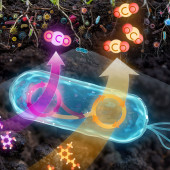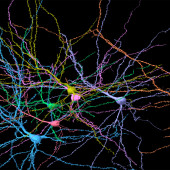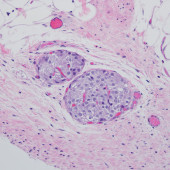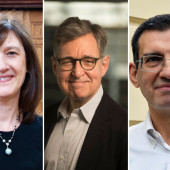Latest Releases
Find our latest releases below. After searching, you can view the most recent releases by clearing the search.
Browse experts on:

Soil bacteria respire more CO2 after eating non-sugar organic matter
June 11, 2024
Microbes respire three times as much carbon dioxide (CO2) from non-sugar carbons from lignin compared to sugar from cellulose. Although microbes consume both types of plant matter at the same time, each type enters a different metabolic pathway

Brain’s structure hangs in ‘a delicate balance’
June 10, 2024
A new Northwestern University study has discovered that the brain’s structural features reside either at or close to a structural phase transition. Surprisingly, these results are consistent across brains from humans, mice and fruit flies, which suggests the finding might be universal.

Northwestern grads a ‘gorgeous lake of purple and white’ at the United Center
June 9, 2024
Instead of the typical outdoor backdrop of Ryan Field, which is currently being rebuilt, Northwestern’s 166th Commencement was held inside the United Center in downtown Chicago, where a jumbotron featured faces of the 7,720 graduates as they processed to their seats.

Antioxidant gel preserves islet function after pancreas removal
June 7, 2024
Northwestern University researchers have developed a new antioxidant biomaterial that someday could provide much-needed relief to people living with chronic pancreatitis.
Kathryn Hahn to address Northwestern’s Class of 2024
June 7, 2024
Northwestern’s 166th commencement ceremony will begin at 10:30 a.m. Sunday, June 9, at the United Center in Chicago. The ceremony will be livestreamed on Northwestern’s Graduation Weekend 2024 website.

Secure access to food and water is decreasing for US children
June 7, 2024
Between 2005 and 2020, the number of children facing simultaneous water and food insecurity in the United States more than doubled. Additionally, Black and Hispanic children were several times more likely than white children to experience food and water insecurity at the same time. This is according to new research by Asher Rosinger, associate professor of biobehavioral health and anthropology at Penn State, and Sera Young, associate professor of anthropology at Northwestern University.

Chicago HOPES for Kids will be the 2025 Dance Marathon primary beneficiary
June 5, 2024
Northwestern University Dance Marathon (NUDM) is partnering with Chicago HOPES for Kids when the popular student run philanthropy effort returns in spring quarter of 2025. Chicago HOPES is a nonprofit that provides educational and holistic support to Chicago students experiencing homelessness

Three top scholars receive 2024 Nemmers Prize
May 30, 2024
Northwestern University has announced the winners of the 2024 Nemmers Prizes in Earth sciences, economics and mathematics. The biennial prizes recognize top scholars for their lasting contributions to new knowledge, outstanding achievements and the development of significant new modes of analysis.

Fatherhood’s hidden heart health toll
May 28, 2024
Heart disease is the leading cause of death among men, and being a father may put men at an even greater risk of poor heart health later in life, reports a new study from scientists at Northwestern University and Ann & Robert H. Lurie Children’s Hospital of Chicago.

Northwestern experts available on Supreme Court rulings
May 24, 2024
Northwestern faculty are available to comment on upcoming Supreme Court rulings expected to be announced in the coming weeks.